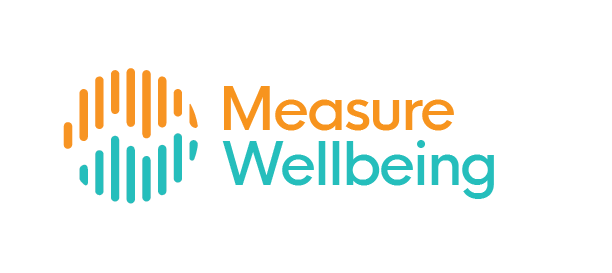Resources
In this section you’ll find additional resources and guidance on planning and carrying out your evaluation. Some of the resources listed are a deeper dive into areas of wellbeing measurement, and others are external links to support organisations or useful publications.
General evaluation resources
This guide focuses on how to approach a wellbeing impact evaluation specifically, and doesn’t cover general principles of evaluation. The following are useful resources and guides for evaluation more generally:
- Inspiring Impact provides free online resources and peer learning networks for VCSE organisations, to help people plan, understand, and improve their impact.
- BetterEvaluation is an international organisation that works collaboratively to create, share and support use of knowledge about how to better plan, manage, conduct and use evaluation.
- The Charity Evaluation Working Group (Chew) is a network for people working in measuring impact in the third sector, including researchers, charity evaluators and support organisations.
- NCVO Knowhow offers advice and support for voluntary organisations, including on measuring impact.
- Evaluation Support Scotland provides advice and support for VCSE organisations, as well as guides, method sheets, webinars, case studies and external publications.
Evaluation approaches and methods
Theory of Change:
- This updated NPC handbook, Theory of Change in 10 steps guide, will help you create a theory of change for any project or programme.
- The Happy Museum’s Story of Change Tool is a simple workshop approach to planning and reviewing the difference you aim to make and how.
Quantitative data and questionnaires:
- Mark Robinson‘s guide to designing questionnaires using multi-item psychometric scales.
- A brief guide on Writing your own questions. Developed by The What Works Centre for Wellbeing, CLES, and New Economics Foundation.
Using qualitative data:
- More guidance on how to use open questions to collect qualitative data for your evaluation. Developed by The What Works Centre for Wellbeing, CLES, and New Economics Foundation.
- A guide to gathering qualitative data for wellbeing evaluations from the Centre for Thriving Places.
- Evaluation Support Scotland’s guide on Capturing Casual Moments, and having a robust and proportional approach to user feedback.
- Shank, G. (2002). Qualitative Research. A Personal Skills Approach. New Jersey: Merril Prentice Hall.
Using Creative Methods to collect data
- Guidance on using creative methods from Inspiring Impact
Economic valuation
- A simple workshop exercise to get people to think about the value of your activities, from Happy Museum
- The Pro Bono Economics guide to wellbeing cost effectiveness analysis when you have imperfect data. Developed in collaboration with the What Works Centre for Wellbeing.
Analysis and interpretation:
- Step-by-step guidance on carrying out a contribution analysis and developing a ‘contribution story’, from BetterEvaluation.
- Contribution analysis toolkit by the Life Chances Trust
Other things to think about
- This practical guide from Oxfam will help you think through the ethical considerations in your evaluation.
- NPC’s Principles of good impact reporting.
- Inspiring Impact case studies of how organisations have approached measurement and evaluation.
Covid-19: resources for evaluation during the pandemic
- A developmental evaluation approach can help in contexts which are changeable, such as the pandemic.
- Inspiring Impact has a number of resources and webinars to support evaluation during Covid-19.
- Better Evaluation has a useful blog series on adapting your evaluation during Covid-19.
- Lupton, D. (editor) (2020) Doing fieldwork in a pandemic (crowd-sourced document).
- This blog from LSE looks at practical and ethical considerations of Carrying out qualitative research under lockdown
Other Centre tools and resources
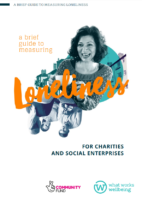 Brief Guide to Measuring Loneliness: includes guidance on recommended measures to evaluate loneliness in adults and children, as well as a downloadable questionnaire to use in your evaluation.
Brief Guide to Measuring Loneliness: includes guidance on recommended measures to evaluate loneliness in adults and children, as well as a downloadable questionnaire to use in your evaluation.
Guide to effective case studies
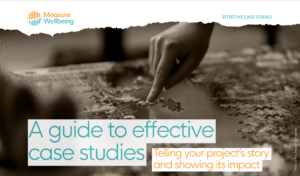 This guide will help you bring together what you have learned about a project or activity in a structured, clear and thorough way, so that you can communicate helpful insights to other practitioners, funders, researchers and the communities you work with.
This guide will help you bring together what you have learned about a project or activity in a structured, clear and thorough way, so that you can communicate helpful insights to other practitioners, funders, researchers and the communities you work with.
Includes template for putting together a project case study
Wellbeing in policy: exploring issues of measurement and methodology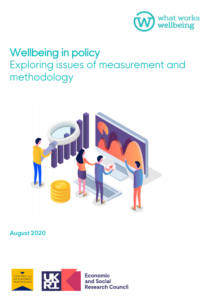 pulls together the history, frameworks, metrics, data and methodologies relating to the application of wellbeing evidence in policy making. It is intended for use primarily by policy analysts seeking to apply a practical wellbeing approach to policy appraisal and evaluation.
pulls together the history, frameworks, metrics, data and methodologies relating to the application of wellbeing evidence in policy making. It is intended for use primarily by policy analysts seeking to apply a practical wellbeing approach to policy appraisal and evaluation.
Wellbeing cost effectiveness measures and methods: a seven-step approach to assess the wellbeing cost-effectiveness of a charitable intervention. Developed jointly by Pro-Bono Economics and The What Works Centre for Wellbeing.
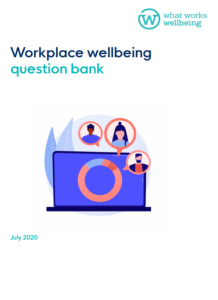 If you’re interested in understand the effect of interventions on workplace wellbeing, these resources can help you:
If you’re interested in understand the effect of interventions on workplace wellbeing, these resources can help you:
